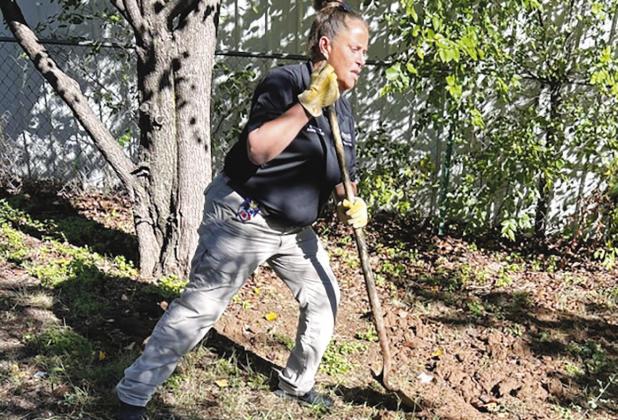

OPD discovers graves in dog cruelty case
A former Olney resident was arrested on an animal cruelty charge after Olney Police discovered a starving dog at the South Grand Avenue house he rented and the graves of three other dogs in the backyard, Police Chief Dan Birbeck said.
The owner of 411 S. Grand Ave. contacted police on Oct. 5 after discovering that an adult female Golden Retriever had been left inside the house after the tenants vacated, Chief Birbeck said.
“The homeowner had rent- ed the home to a family and had discovered that a dog had been left in the house and that the house was basically abandoned,” Chief Birbeck said. “A dog was found in the home living in feces and without food or water, and was in extremely poor, emaciated and starving condition. The bones were showing on her shoulders, rib cage, and hips.”
The officers, including Animal Control Officer Hollie Hawkins, found signs that the dog had been eating clothing to try to stay alive, Chief Birbeck said.
“Officer Hawkins had previous history with the owner for ‘dog-at-large’ [calls] and also knew the owners,” he said. “The dog was seized and transported to Salt Creek Veterinary Clinic for medical evaluation. The on-call veterinarian stated that the dog is extremely anemic and suffers from multiple health concerns. The vet stated that without medical intervention the dog would not live more than a couple more days.”
The dog weighed 17 pounds. On average, adult female Golden Retrievers weigh 55-60 pounds, according to the American Kennel Club.
While at the veterinary clinic, the dog had a bowel movement and the feces were collected and examined, Chief Birbeck said. The feces contained a blue clothing material that was photographed as evidence, he said.
Police tracked down the tenant using information provided by the homeowner. Officers arrested Oscar Nuncio, 28, in Wichita Falls and charged him with cruelty to non-livestock animals.
The “very docile, loving dog” has been released to an animal rescue organization and is being rehabilitated, Chief Birbeck said.
Officers also discovered the graves of three other dogs owned by Mr. Nuncio in the backyard of the South Grand Avenue home, Chief Birbeck said.
“We were first led to believe that the male dog had been taken to Wichita Falls but it was later found that the dog had actually died and was buried in the back yard along with two puppies,” he said.
Olney Police contacted the Texas A&M School of Veterinary Medicine and Biomedical Sciences to have a veterinarian on site when they exhumed the graves, Chief Birbeck said.
“Due to the amount of time they had been dead, we were unable to determine a cause of death,” he said. “Because of that inability to determine the cause of death there were no charges filed for the deceased dogs on the property. But we did go the extra mile to make sure that we tried to identify the cause of death by involving a veterinarian on site and the head of the A&M veterinary school.”
Chief Birbeck and Officer Hawkins urged members of the public to contact Olney Police for help taking care of animals in the wake of the seizure of more than two dozen emaciated dogs from a home on Payne Street earlier this year.
“I will reiterate, if you commit animal cruelty in Olney, Texas, you will be charged and you will go to jail,” Chief Birbeck said. “If you cannot care for your animals, you need to ask for help. We can help, whether it’s temporary help or surrendering animals so we can get them adopted. But to simply neglect them, there is no excuse for that because there is help available.”
duced at the regular legislative session earlier this year but were defeated by Democrats and rural Republican lawmakers in the House. Lt. Gov. Dan Patrick and Gov. Greg Abbott have threatened to recruit primary opponents for Republican senators who oppose the legislation, and Gov. Abbott said he would not sign legislation to raise teacher salaries or school budgets, despite inflationary pressures, unless the voucher plan was passed.
“It is not equitable or efficient and, in my professional opinion, unconstitutional,” Dr. Greg Roach, superintendent of the Olney Independent School District, said. “It is also flat wrong for an elected official – specifically the Governor – to publicly state that they will … find someone to run against any legislator who votes against an education savings account or voucher bill.”
Parents could use the ESA funds to help pay for private school tuition, pay for private tutors, uniforms, transportation, and other approved costs, the Senate website said. “Should demand outstrip available slots, ESAs will be assigned via lottery,” the Senate website said. “The program will be administered by the office of Comptroller and money would go directly from these accounts to approved education providers.”
The measure would not require private schools or homeschools that receive public funds to administer the standardized tests that are required in public schools. The program, long billed as a way for low-income families to escape failing urban schools, would allow families who earn as much as 500 percent above the federal poverty line – or $150,000 for a family of four – to use the ESAs for private schools.
The Texas House now will consider a version of the ESAs. The voucher scheme is likely to face opposition from rural lawmakers. Lubbock Sen. Charles Perry amended SB 1 to grant each district with a student population less than 5,000 compensation of $10,000 for three years for each student that leaves public education because of the new ESA program, the Senate website said.
Rep. David Spiller, who represents Olney, said he would wait to comment on the issue when he sees the House version of the Education Savings Account program.
Dr. Roach noted that public schools receive a basic allotment of $6,160 per student each year less than the proposed amount of public funds that would flow to private schools if the bill becomes law. The Senate also passed Senate Bill 2, which includes a new “teacher retention allotment” equivalent to an across-the-board pay increase of $3,000, the Senate website said. The bill’s sponsor said rural teachers, “whose salaries can lag their urban colleagues’ by tens of thousands of dollars would get an additional $7,000 through the new allotment,” the Senate website said. The bill also expands the teacher merit pay system, which allows districts to identify their best educators and pay them more, and would increase the basic allotment by $75, the Senate website said.
Dr. Roach called the $75 basic allotment increase “ridiculous.”
“There are much better ways to increase funding,” Dr. Roach said. “An increase to the basic allotment would be equitable and efficient. The $75 increase is ridiculous. A basic allotment increase from the current $6,160 to around $7,200 would probably suffice coupled with teacher pay raises and full targeted funding for safety and security mandates.”
Dr. Matt Caffey, Olney Elementary School principal, said the $500 million appropriated by SB1 would be better spent on public education because “from a fiscally conservative standpoint there is no accountability for public dollars and how they are used in a private school.”
“You can’t find a better education than you will find in a rural West Texas school, especially for the cost,” he said. “And I don’t think the people behind these bills that are from more urban areas with different problems than we have in rural areas … have given any thought to what it could do to rural West Texas economies, cultures and everything else. I just think it’s putting education in the crosshairs of the culture wars and that’s not where we need to be.”
